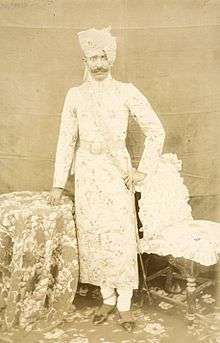Piploda State
Piploda State was an estate in India at the time of the British Raj. It belonged to the Malwa Agency, part of the Central India Agency. The state had an area of 155 km².
| Piploda State | |||||||
|---|---|---|---|---|---|---|---|
| Princely State | |||||||
| 1547–1948 | |||||||
| Area | |||||||
• 1901 | 155 km2 (60 sq mi) | ||||||
| Population | |||||||
• 1901 | 11441 | ||||||
| History | |||||||
• Established | 1547 | ||||||
• Independence of India | 1948 | ||||||
| |||||||

History
The thakurs of Piploda were Dodia Rajputs from the Kathiawar region, one of the ancestors called Kaluji migrated to Malwa and captured the fort of Sabalgarh in 1285. The Sixth son of Kaluji who was called Shardul Singh extended his domains and founded the village of Piploda. During the rise of the Marathas in Malwa, Piploda was reduced to a great extent and the thakur was forced to become a vassal of Amir Khan Pindari. Piploda later benefited from the treaty of Mandsore, in which Jaora was confirmed as a princely state by the British. The Thakur of Piploda was allowed to rule in his estate on the condition that he pays Rs.28,000 as tribute to the Jaora nawab. During the great Indian mutiny, the Thakur of Piploda helped the British authorities by sending his army to Mandsaur. The estate had 28 villages, a population of 11,441 (1901) and a revenue of Rs.95,000 (1901). [1] The last ruler acceded to the Government of India on 15 June 1948, and Piploda became part of Ratlam District of Madhya Bharat state.
Thakurs
- .... - .... Sadal Singh
- 1820 - 18.. Prithvi Singh
- 18.. - 18.. Umed Sigh
- 18.. - 12 Nov 1863 Onkar Singh (d. 1863)
- 30 Nov 1863 – 26 Oct 1888 Dulai Singh (b. 1852 - d. 1888)
- 8 Nov 1888 - 4 Nov 1919 Kesri Singh (b. 1872 - d. 1919)
- 5 Nov 1919 - 1936 Mangal Singh (b. 1893 - d. 1936)
- 1936 - 15 Jun 1948 Raghuraj Singh
External links
| Wikimedia Commons has media related to Piploda State. |